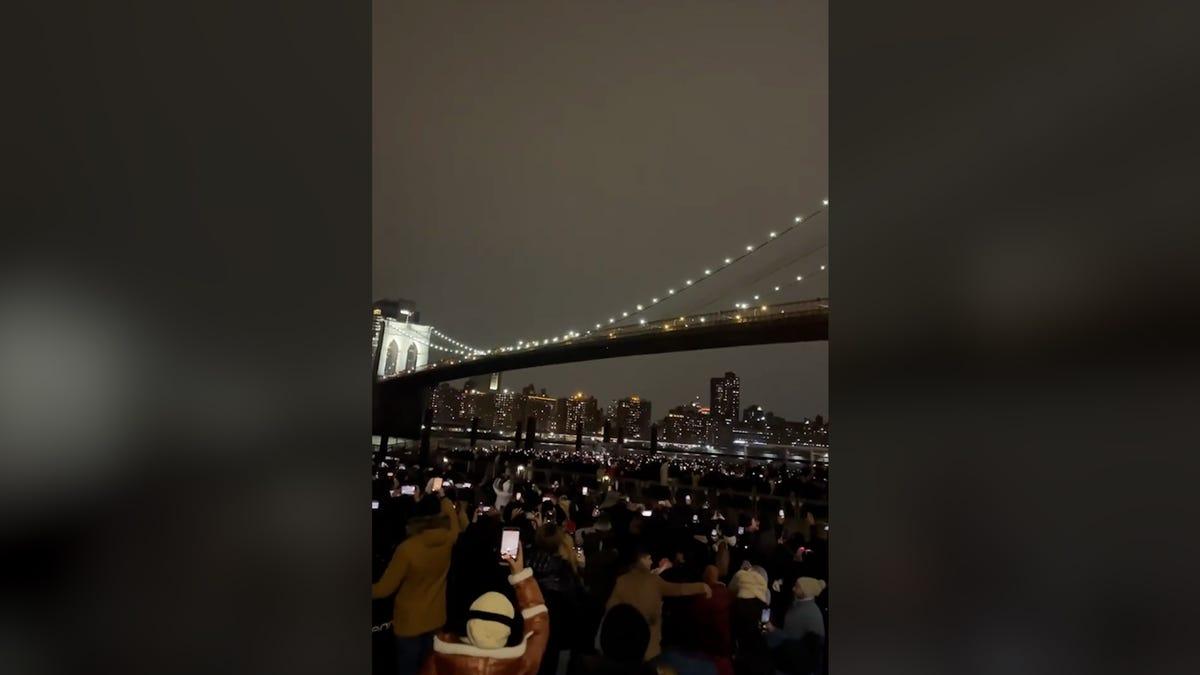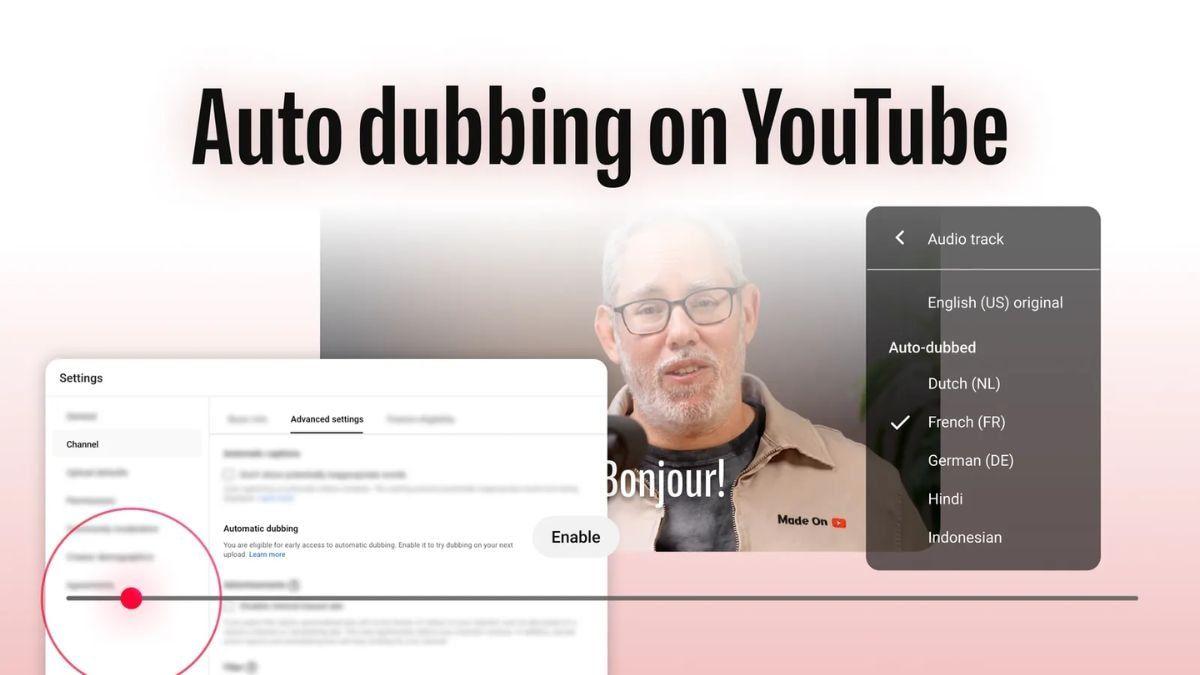AI-Generated Content Tricks Thousands into Attending Fake Halloween Parade in Dublin
7 Sources
7 Sources
[1]
AI fools thousands of people to show up for a fake Halloween parade
Apologies have already been issued by the people behind the event that misled thousands of Dubliners out of their homes to a fraudulent Halloween parade. The Halloween parade was organized and listed on the My Spirit Halloween website, where it stated the Mácnas parade was occurring between 7pm and 9pm on Thursday last week. Thousands of people showed up to the event and reports by people on the ground, including video, show an incredibly busy street with many rows of people deep that are blocking traffic from using the road. Participants of the event were then informed by the Irish police that no event was happening and were ordered to disperse. It now appears a member of the team organizing the event simply cut and pasted the notice for last year's event onto the calendar for 2024. Additionally, a Pakistan-based company has issued an apology to Dubliners for the phony event, claiming the mishap occurred due to "human error" on the website. A Pakistan-based man behind the website apologized to the misled people, saying he and his team is "highly depressed", "embarrassed," and "very sorry". Since the marketing for the fake event circulated on social media, many who showed up for the event were quick to fire back My Spirit Halloween, alleging artificial intelligence-powered tools were used by the event holders to fool the public, and ultimately drive traffic to the website for ad revenue purposes. "It was our mistake and we should have doubled checked it to make sure it was happening. But newspapers are reporting that we posted it intentionally and this is very, very wrong," said Nazir Ali However, according to Ciarán O'Connor, a researcher and investigator at the Institute for Strategic Dialogue, it appears My Spirit Halloween was set up for advertising revenue purposes. Moreover, a purported scheme was uncovered that connects My Spirit Halloween to multiple fake Facebook pages that were used to promote the campaign, stolen photos from real Mácnas parades, along with AI-generated text. Moreover, O'Connor said at least 30% of the content found on the website was made with the "assistance of AI". Whether or not the website and the marketing campaign were created with the sole intention of generating advertising revenue through redirects back to the website's landing page, this story is an example of how AI-generated content coupled with human-made misinformation can result in thousands of people being misinformed about a topic. At its most fundamental, the situation highlights the power of misinformation, and perhaps the increased power of misinformation when its paired with AI-powered tools.
[2]
Thousands Tricked By AI Ad to Show Up For Fake Halloween Parade
You see an ad for a glitzy Halloween parade. You spend weeks getting your costume together (or maybe you settle for a blanket over your head). On the big night, you show up with thousands of others. Suckers, all of you. There's no procession, no parade. That's right: you just got duped by a totally fake ad campaign, generated with AI. This is what happened in Dublin last night, where after waiting for at least an hour, the attendees slowly caught on that nothing was actually planned for that evening. Photos and videos shared on social media capture the total anti-climax of a scene. "No Gardai around" -- that's what they call cops in Ireland -- "no official announcement, people waiting on the wrong side of the road..." tweeted one person who turned out to the nonevent. "Someone did pull a big #hoax #prank." The crowd got so big that the Irish police had to make an announcement, putting the issue to bed: "Please be advised that contrary to information being circulated online, no Halloween parade is scheduled to take place in Dublin City Centre this evening or tonight." The culprit was a craftily fabricated ad campaign originating from a website called myspirithalloween.com. It claims to be "your ultimate destination for all things Halloween," and for some reason prominently features a picture of Portuguese soccer star Cristiano Ronaldo. But not all was as it seemed. Despite the site claiming to be based in Illinois, "all signs point to the person(s) behind it being based in Pakistan," Ciarán O'Connor, a researcher and investigator at the Institute for Strategic Dialogue, wrote in a thread on his findings. "The 'My Spirit Halloween' site was likely created for [ad revenue] purposes," he suggested. And it goes deep. The scheme included fake Facebook pages to promote the parade, real photos from previous parades done by the performance company Macnas, and tons of AI-generated text, O'Connor found. The word "transform" is used everywhere on the website. The about page lists four seemingly fake writers with portraits that you'd clock as AI-generated from a mile away. According to O'Connor, the person who runs the website admitted that at least 30 percent of the content was made "with the assistance of AI," while some was done by human contractors. And with the bogus page as a launching point, a combination of runaway algorithms, tricky SEO, and actual social media word-of-mouth handled the rest, especially on Facebook and Tiktok. Needless to say, this is a pretty clear-cut example of the misinformation that AI can perpetuate. Chatbots make it virtually effortless to generate all the ad copy and flowery text you need to fill up a fake website. And if need be, it can fake images for you, too. Some of the blame should go to social media sites, however, which reward SEO-ified garbage AI content. Facebook in particular seems institutionally addicted to promoting AI slop, paying money to creators who game its algorithms by shoving surreal, machine-amalgamated imagery into users' feeds for the high engagement they generate on the platform. In sum: the misinformation machine is hummin'.
[3]
AI Slop Website Sent Thousands of People to a Halloween Parade That Didn't Exist
Thousand of Dublin residents were misled by an AI chum website promoting events that aren't real. Many criticisms regarding artificial intelligence live in the realm of theoretical or hard to gauge. We don't know just how many people are swayed by disinformation produced by AI, for instance. But every now and then we get a real life, tangible case of AI messing with people's lives. Case in point, an apparent AI-generated content farm deceived thousands of Dublin residents into visiting the city center for a supposed three-hour Halloween parade. The parade was never real. After trying to disperse the misinformed crowd of thousands, Ireland's national police service was forced to release a statement informing the public that there was never any parade scheduled. Defector investigated the website behind the misleading event post. Called "My Spirit Halloween," it's apparently based in Pakistan and dedicated solely to promoting Halloween events across the world. The idea is to exploit Google search so that whenever someone is looking for Halloween events in their city, My Spirit Halloween will show up the near the top of results and can bank on generating ad revenue. More mainstream websites participate in the same practice to get easy traffic, for instance, when people are searching to find out when the next season of Stranger Things is coming out. But it appears that My Spirit Halloween was using AI to automatically generate listings or just trolling peopleâ€"at one point, the website alluded to the possibility that Mr. Beast would be in attendance. It's one of the ways in which Google's algorithms and how it decides to rank content can have a real impact on people's lives. A less nefarious example would be recipe websites that have really long introductions before the actual recipe; another tactic to rank highly in search. The event page for the supposed Dublin parade now includes the following statement: We are hereby to announce that the information that misguided thousands of Irish people is a big mistake made by our content writer. Also, this was purely not done intentionally. And we apologize to our Irish brothers for this misunderstanding. Despite this "misunderstanding," the site now lists the event as "cancelled." If you're unsure about a website's legitimacy, check out their about page. Don't trust any masthead that looks like this:
[4]
An AI-generated website convinced thousands of people to show up to a fake Halloween parade in Ireland, showing how unprepared we are for AI misinformation
Dublin. Filled to the brim with gigs, events, and nightlife, I often get a ping of nostalgia just looking at the spire -- thanks to my years there spent chasing my degree. However, after looking at the crowds of people caught up waiting for a Halloween parade that would never come, I'm very glad I wasn't back there this week. Seemingly coming from an AI-generated website based out of Pakistan, thousands of people in Dublin, Ireland, crowded around O'Connell Street for a parade that would never come. The site claimed to have originated this parade is called "Myspirithalloween" and appears to have stolen that name from Spirit Halloween, the Halloween retailer that focuses specifically on costumes, decorations, and general festivities. The attached Facebook page has since deleted all its posts and its Pinterest page has fake Mr Beast giveaways being used to promote (also) fake events. The original Dublin Halloween parade page also appears to have been deleted from the website, but there are still plenty of other Irish events advertised on there, some of which appear to actually be real. The Myspirithalloween website is plastered in ads and there's tons of AI-generated content on its Pinterest and Facebook, so you could make the argument that this is inventing fake events to get page clicks. However, the presence of real events, and thousands of written words about those events, suggests this could actually simply be an aggregator, using an AI tool to scrap data from the internet, and then letting that tool categorize that information as it sees fit. I couldn't personally verify if the website really did originate the claims of a Dublin parade but it certainly appears to have spread them, and screenshots from searches near the time of the event show it had some presence in Google. It's unlikely many of those in the streets actually saw the original site but enough would have seen it to have shared with passers-by. O'Connell Street is an incredibly popular location, having many businesses, and it's central for commuters, both those who take the tram (called the Luas) and the bus. The fact that someone with access to an AI model could contribute to this widescale a panic is certainly worth concern, and the thousands who wasted their time in a very crowded place must certainly regret hanging around for nothing. Even the Garda Síochána (the Irish police) had to put out a statement about the parade. However, it's important to note the human element of this, and how likely you are not just to fall victim to AI misinformation (be it malicious or not) information spread via seemingly well-intentioned strangers, just waiting for a good night out.
[5]
Crowds Get Ghosted by Fake Halloween Parade Invented on Social Media
Crowds of revelers lined the streets of Dublin, Ireland, this week for a Halloween parade, but there was one major problem: The city was not hosting a parade. Residents were duped by fake, AI-enhanced ads that reportedly originated on a Pakistan-based Facebook page called My Spirit Halloween, according to Stephen McDermott, an editor at The Journal FactCheck, a publication focused on tackling misinformation in Ireland. The Facebook page included costume contest guidelines and promised a "spectacular display." Other social media accounts shared the event, widely disseminating the false information and leading the Gardaí, or Irish national police, to issue a statement last night: "Please be advised that contrary to information being circulated online, no Halloween parade is scheduled to take place in Dublin City Centre this evening or tonight." Some posts featured Halloween-themed images generated by AI, captioned with hashtags that helped them become discoverable in Google search results. The page owners have since deleted all posts and removed their location. Those behind the Facebook page were presumably trying to drive traffic to their similarly named website to cash in on ad revenue. The website is still live and advertising events in more cities, including three on Nov. 1 -- one in Canada and two in Australia. As Ireland-based publication Goosed notes, "running a website is relatively cheap, [and] for niche seasonable topics like Halloween, it can be easier to rank" on Google. According to The Journal FactCheck, Dublin has held Halloween parades in the past (pictured above) but did not have one scheduled for this year. "So people might expect one, both down to our enjoyment of parades in general and Ireland being Halloween's spiritual home," Goosed says. (Halloween's origins trace back to a Celtic celebration in Ireland, celebrated over 2,000 years ago.) This particular incident is pretty harmless, and people appear to have left the area without incident. But online misinformation has been used for more nefarious purposes. False reports on X about an illegal immigrant stabbing a 5-year-old girl fueled violent far-right protests in 2023, spreading at a rate that "surprised" the Gardaí, the Irish Times reports. A similar incident happened in the UK this summer following a stabbing rampage that left three children dead.
[6]
The Guy Behind the Fake AI Halloween Parade Listing Says You've Got It All Wrong
An SEO agency owner says he is "very depressed" after one of his AI-assisted Halloween parade listings misled revelers in Dublin, Ireland. This Halloween, crowds lined the streets in central Dublin and waited for a parade to begin. They'd gathered after a website called MySpiritHalloween.com published an AI-generated article promoting the festivities. The post promised "spectacular floats to thrilling street performances" and described the route in detail. The parade never came -- but the spectacle of throngs of people milling around for nothing became an event unto itself. Afterward, the incident went viral as an example of AI slop seeping into the real world. Since the generative AI boom began, a class of SEO entrepreneurs has started pumping out AI-generated content on websites and across social platforms, in efforts to make money off online advertising and affiliate marketing. MySpiritHalloween.com owner Nazir Ali is one of them. WIRED spoke with Ali via Google Meet to get his side of the story. He insists it's all just a big misunderstanding. This interview has been edited for length and clarity. I am actually good, but we are highly embarrassed. We are highly depressed that everyone is reporting against us. They're calling us scammers, saying that we scammed. This was not on purpose! Can you explain what happened? The thing is, we are the content creators. I am the owner of a SEO agency. We make websites and we rank them on Google. We hired some content writers online, and they helped us out on all the Halloween events throughout the world: in the USA, in UK, and most importantly, Ireland. If there are any mistakes, for example you see an event and it was moved -- there were some events in Dubai, but hotel management texted us and said that the event was not listed, so we removed it immediately. But no one reported that this one wasn't going to happen. As soon as we knew, we changed it. We even wrote this has been canceled, but it was too late. I want to ask about the AI of it all -- I'll explain it to you. You can easily write a whole website with AI. But it is not easy to rank on Google's first page, and our site was ranked on the first page. It was even on the first position of the first page. Okay, AI was involved. We asked ChatGPT to write the article for us, but it wasn't ChatGPT by itself. So we took help from AI, we took help from ChatGPT, but we optimized that ourselves.
[7]
All Trick, No Treat: Dublin Crowds Turn Up for Halloween Parade That Wasn't
Hundreds of Dubliners made their way to the city center on Thursday night, excited for a Halloween parade to take place on a mild October evening as they lined up along O'Connell Street, a major thoroughfare. But they waited and waited (and waited), and a realization settled in: The parade hadn't arrived. The parade was never coming. The parade never even existed. There was no parade. So many people had gathered for the nonexistent spectacle that the local police announced on social media around 8 p.m., an hour after the parade was supposed to begin, that no event was planned and asked the crowds to "disperse safely." It seemed like the ultimate trick. How were so many people duped into lining up for a treat they didn't get, a parade that never was? The culprit seems to be the website MySpiritHalloween.com, which contains a glut of Halloween event listings, costume tips and game ideas. The site lists Halloween events in multiple places, including in Britain, Ireland and the United States. That included a parade in Dublin, with a precise location and start time. The owner of the website, Nazir Ali, said on Friday morning that he had not intended to dupe anybody, claiming the whole thing was a mistake. "It was not a joke, not a scam," he said. It was "not on purpose." Mr. Ali, who owns at least five other websites, declined to say where he was based, but said that MySpiritHalloween.com used artificial intelligence to generate its content. Humans are involved in the website's search engine optimization efforts to ensure it ranks highly on sites like Google, he said, but much of the information is produced by A.I. The website, he said, compiled information from about 1,400 Halloween events from all over the world. The nonexistent parade in Dublin was said to be put on by Macnas, an Irish theater group that has previously staged parades and held one this year in Galway -- but not Dublin. (Dublin has hosted Halloween parades in past years, but not in 2024.) That information was readily available elsewhere on the internet but seems to have been missed by many people who saw or were told about the A.I.-generated content, which was also shared across social media by local people and businesses, The Irish Times reported. "On the face of it, it seems strange that people would believe it," said Nick Anstead, an associate professor in the Department of Media and Communications at the London School of Economics and Political Science. "After all, not one official confirmed the event was happening. But on the other hand, the information didn't just come from one source; it was disseminated across a network of influencers and presumably shared further among people who knew and trusted each other." "Not everything on the site was fake," he added. "Some of the events cited around the world were real, and it is the conjunction of the real and fake which makes the hoax convincing." When he realized the mistake, Mr. Ali said, he removed the event from the website. "Everyone is blaming us," he said. "We were very embarrassed." But for many people on Thursday, the rectification came too late, as they stood in Central Dublin eagerly awaiting people in costumes but seeing only buses and cars drive by instead. It did not take long for fun to be made of the hoax, including at Dublin Airport, which posted a picture on X of an empty terminal with the caption "our Halloween parade in full flow." Besides listing parades, MySpiritHalloween.com offers tips for enjoying the holiday, including: "Use mini pumpkins as bowling balls and empty cans decorated with Halloween themes as pins. Set up a bowling alley in your backyard or living room for hours of fun." The site also has itself as being for sale. Dr. Anstead likened the episode to another internet trend, the flash mob. "People use the sharing and organizational capacities facilitated by the internet to arrange to meet at a single place or time for some kind of coordinated activity," he said. "Clearly, this crowd in Dublin was not a flash mob, but it did have many of the same attributes in terms of how it was created." Only this time, the mob showed up and nothing was there.
Share
Share
Copy Link
An AI-generated website and social media campaign fooled thousands of Dublin residents into showing up for a non-existent Halloween parade, highlighting the potential dangers of AI-powered misinformation.

AI-Generated Website Sparks Confusion in Dublin
In a striking demonstration of AI's potential to spread misinformation, thousands of Dublin residents were misled into attending a non-existent Halloween parade. The incident, which occurred last week, was triggered by a website called "My Spirit Halloween" that advertised a fictitious event in the city center
1
.The Deception Unfolds
The website claimed that a "Mácnas parade" was scheduled between 7 pm and 9 pm on Thursday. As a result, crowds gathered on O'Connell Street, a popular location in Dublin, causing significant disruption
4
. The situation became so chaotic that the Irish police, known as Gardaí, had to intervene and disperse the crowd, issuing a statement clarifying that no parade was scheduled5
.AI's Role in the Misinformation
Investigations revealed that the website behind the false event was likely created using AI-generated content. Ciarán O'Connor, a researcher at the Institute for Strategic Dialogue, found that at least 30% of the website's content was produced with AI assistance
2
. The scheme involved multiple fake Facebook pages, stolen photos from real Mácnas parades, and AI-generated text1
.The Motivation Behind the Deception
While the website claimed to be based in Illinois, evidence suggested it was operated from Pakistan. The primary motive appears to be generating ad revenue through increased website traffic
2
. This incident highlights how AI can be exploited to create convincing fake events and content, potentially for financial gain.Related Stories
Implications for AI and Misinformation
This event serves as a stark reminder of AI's potential to amplify misinformation. The ease with which AI can generate realistic content, combined with social media's ability to rapidly spread information, creates a powerful tool for deception
3
. It also exposes vulnerabilities in search engine algorithms and social media platforms that can be exploited to disseminate false information4
.Broader Concerns and Future Implications
While this incident was relatively harmless, it raises concerns about more serious potential misuses of AI-generated content. Past events have shown how online misinformation can fuel violent protests and social unrest
5
. As AI technology continues to advance, the challenge of distinguishing between genuine and fabricated information is likely to become increasingly complex, necessitating improved detection methods and digital literacy among the public.References
Summarized by
Navi
Related Stories
Thousands duped by AI misinformation into attending fake New Year's Eve fireworks at Brooklyn Bridge
03 Jan 2026•Entertainment and Society

AI-Generated Articles Slip Through Editorial Filters at Major Publications
22 Aug 2025•Technology

AI-Generated Spam Infiltrates Major Websites: Nvidia, CDC, and Others Affected
12 Jun 2025•Technology

Recent Highlights
1
SpaceX acquires xAI as Elon Musk bets big on 1 million satellite constellation for orbital AI
Technology

2
French Police Raid X Office as Grok Investigation Expands to Include Holocaust Denial Claims
Policy and Regulation

3
UNICEF Demands Global Crackdown on AI-Generated Child Abuse as 1.2 Million Kids Victimized
Policy and Regulation





